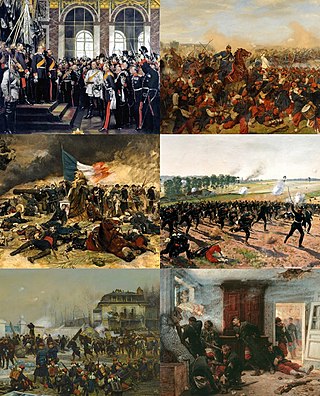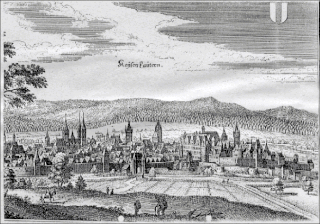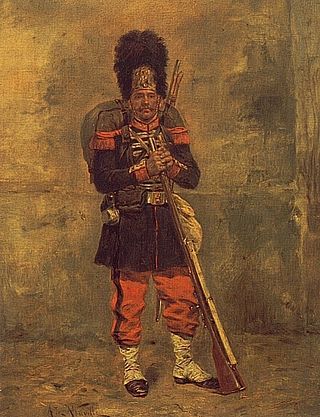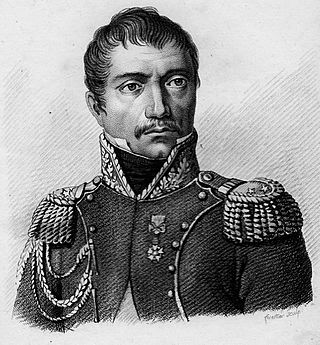
The Franco-Prussian War or Franco-German War, often referred to in France as the War of 1870, was a conflict between the Second French Empire and the North German Confederation led by the Kingdom of Prussia. Lasting from 19 July 1870 to 28 January 1871, the conflict was caused primarily by France's determination to reassert its dominant position in continental Europe, which appeared in question following the decisive Prussian victory over Austria in 1866. According to some historians, Prussian chancellor Otto von Bismarck deliberately provoked the French into declaring war on Prussia in order to induce four independent southern German states—Baden, Württemberg, Bavaria and Hesse-Darmstadt—to join the North German Confederation; other historians contend that Bismarck exploited the circumstances as they unfolded. All agree that Bismarck recognized the potential for new German alliances, given the situation as a whole.

François Marcellin Certain de Canrobert was a French Marshal. He demonstrated ability during the Second French Empire while participating in the Battle of Alma, the Battle of Magenta, the Battle of Solferino and the Battle of Gravelotte. A staunch supporter of Napoleon III, he became, under the French Third Republic, one of the leading figures in the Bonapartist party and chairman, from 1876 to 1894, of the Senate within the French parliamentary group "Call upon the people".

Antoine Adolphe Marcelin Marbot, known as Adolphe Marbot, was a French general. He belongs to a family that has distinguished itself particularly in the career of arms, giving three generals to France in less than 50 years. His younger brother, Marcellin Marbot, was also a general.

Gaston Alexandre Auguste, Marquis de Galliffet, Prince de Martigues, was a French general, best known for having taken part in the repression of the 1871 Paris Commune. He was Minister of War in Waldeck-Rousseau's cabinet at the turn of the century, which caused a controversy in the socialist movement, since independent socialist Alexandre Millerand also took part in the same government, and was thus side by side with the Fusilleur de la Commune.

Michael Kovats de Fabriczy was a Hungarian nobleman and cavalry officer who served in the Continental Army during the American Revolutionary War, in which he was killed in action. General Casimir Pulaski and Kovats are together known as the "Founding Fathers of the US Cavalry."

The Battle of Kaiserslautern saw a Coalition army under Charles William Ferdinand, Duke of Brunswick-Wolfenbüttel oppose a Republican French army led by Lazare Hoche. Three days of conflict resulted in a victory by the Prussians and their Electoral Saxon allies as they turned back repeated French attacks. The War of the First Coalition combat was fought near the city of Kaiserslautern in the modern-day state of Rhineland-Palatinate, Germany, which is located about 60 kilometres (37 mi) west of Mannheim.

The Imperial Guard of Napoleon III was a military corps in the French Army formed by Napoleon III as a re-establishment of his uncle Napoleon I's Imperial Guard, with an updated version of the original uniforms and almost the same privileges.

Henri Jules Bataille was a nineteenth-century French soldier. He rose to général de division of infantry, saw colonial service in Algeria, and fought in the Second Italian War of Independence and the Franco-Prussian War. He was awarded the Grand Cross of the Legion of Honour.

Dominique Louis Antoine Klein served in the French military during the French Revolutionary Wars and the Napoleonic Wars as a general of cavalry.

Antoine François Eugène Merlin was a French soldier and general of the French Revolutionary and Napoleonic Wars, who fought in central Europe, the Peninsular War and at Waterloo. Later in life, he became a politician and sat in the Chamber of Deputies as a supporter of the July Monarchy.

Charles Louis Dieudonné Grandjean became a French division commander and saw extensive service during the Napoleonic Wars. In 1792 he gave up his legal career to enlist in the infantry and served in the Army of the Rhine. In March 1799 he earned promotion to general of brigade by distinguished actions at Verona. That year he led an Army of Italy brigade at Magnano, the Trebbia, Novi and Genola. In 1800 he fought at Stockach and Hohenlinden.

Christophe Antoine Merlin became a French division commander during the Napoleonic Wars. He joined a volunteer regiment in 1791 and fought against the Kingdom of Spain in the War of the Pyrenees. After becoming an officer in the 4th Hussar Regiment, he participated in the Rhine and Italian campaigns. In 1805 he was promoted general of brigade and fought in Italy and in the 1806 Invasion of Naples. Later he became an equerry to Joseph Bonaparte when that individual headed the Kingdom of Naples.
Joseph Faron was a French general. He came from a working-class background and did not complete his secondary education. He served with distinction in Senegal, was interim Governor of French Cochinchina in 1869–70, and played important roles in the two sieges of Paris during and after the Franco-Prussian War.

The Franco-Irish Ambulance Brigade was a volunteer medical corps sent from Ireland to assist the French Army in the 1870–71 Franco-Prussian War. At the time Ireland was part of the United Kingdom of Great Britain and Ireland and parliament had passed the Foreign Enlistment Act 1870 which, in most circumstances, prohibited British citizens from enlisting in foreign armies. As a non-combatant force the ambulance brigade was not covered by the act. Around 280 men joined the brigade which arrived in France in early October 1870. They served with the French armies of the North and of the Loire until the signing of the armistice in January 1871. The unit was controversial as only a minority of the men who enlisted were retained for ambulance service, with many choosing instead to fight in the French Foreign Legion. The British government investigated the unit for breaches of the 1870 act but no prosecutions were brought.
Alphonse-Théodore Lecointe was a French general and politician.

The Battle of Châteaudun took place in northwestern France during the Franco-Prussian War, which took place on 18 October 1870. In this battle, the Imperial German Army led by General Friedrich Wilhelm Ludwig von Wittich attacked the city of Châteaudun and captured the city. During the nine-hour battle the attackers defeated forces that included Francs-tireurs led by Ernest de Lipowski who was of Polish origin. Although it ended in defeat, the resistance of the French army at Châteaudun is recorded by one document as legendary. The fighting at Châteaudun was immortalized by a painting by Philippoteaux.
The Battle of Chateauneuf-en-Thimerais was a battle of the Franco-Prussian War, which took place on November 18, 1870, in the commune of Châteauneuf-en-Thymerais in France. This was one of a series of victories by a division of the Prussian army along the Loire under the command of Frederick Francis II, Grand Duke of Mecklenburg-Schwerin before the Garde Mobile's forces fledgling by commander Minister Fiereck, within a week after the Imperial German Army was defeated at the Battle of Coulmiers. During the Battle of Châteauneuf-en-Thimerais, the 22nd Division of the Kingdom of Prussia – noted as a brave division – was under the command of General Friedrich Wilhelm Ludwig von Wittich who captured the commune, taking in his hands hundreds of French prisoners of war. The failure at this battle forced the French forces to retreat westward.

The Battle of Artenay' also known as the Battle of Arthenay, took place during the Franco-Prussian War, on October 10, 1870, in Artenay a small town located on the road from Orléans to Paris, France which was about 10 miles north of the city of Orléans. In this fierce battle, with superior strength compared to the opponent, The I Corps of the Kingdom of Bavaria, under the command of Lieutenant General Ludwig von der Tann-Rathsamhausen, in collaboration with the 22nd Division of the XI Corps of the Kingdom of Prussia and the two cavalry divisions of the Prussian army attacked and penetrated the defense system of the army of the Loire of the young French Republic, under the control of general Joseph Edouard de la Motterouge, causing heavy losses for the French military of which many people were taken prisoner. The winning conditions Artenay were favorable enough for Von der Tann to strike Orléans, while the forces of France knocked back on Orléans forest in an agitated state. Despite this, Nièvre's Garde Mobiles and the Pontifical Legion in the French army were noted for their strong resistance, while a monk in Prussian Cavalry under the command of Prince Albrecht demonstrated his prowess in the battle at Artenay.

The Battle of Varize took place during the Franco-Prussian War on 29 November 1870, in Varize, on the river Conie. In this battle, the First Bavarian Corps under the command of Lieutenant General Infantry Ludwig von der Tann attacked a guerrilla army franc-tireurs of the French Republic under the command of Colonel Ernest de Lipowski, and made them scatter. Despite this, the defense at Varize enabled General Antoine Chanzy, commander of the French Army of Loire, to establish a defensive formation against the Prussian army under the direction of Friedrich Franz II, Grand Duke of Mecklenburg-Schwerin. With their victory at the Battle of Varize, Bavarian forces captured a number of well-equipped French guerrillas.

Adrien Alexandre Adolphe de Carrey de Bellemare, more commonly known as Carey de Bellemare, was a French Divisional General who was most notable for his service during the Franco-Prussian War.

















